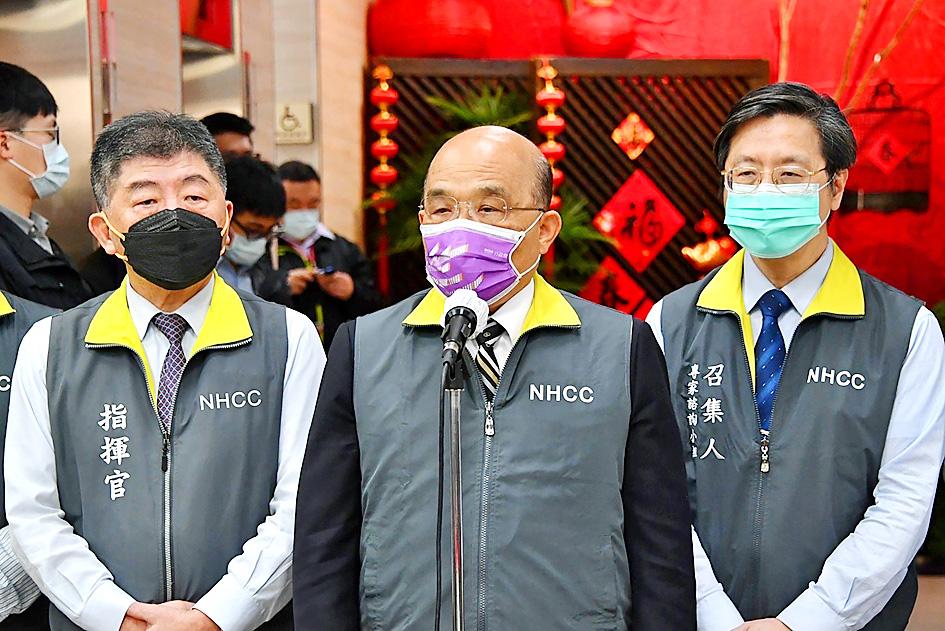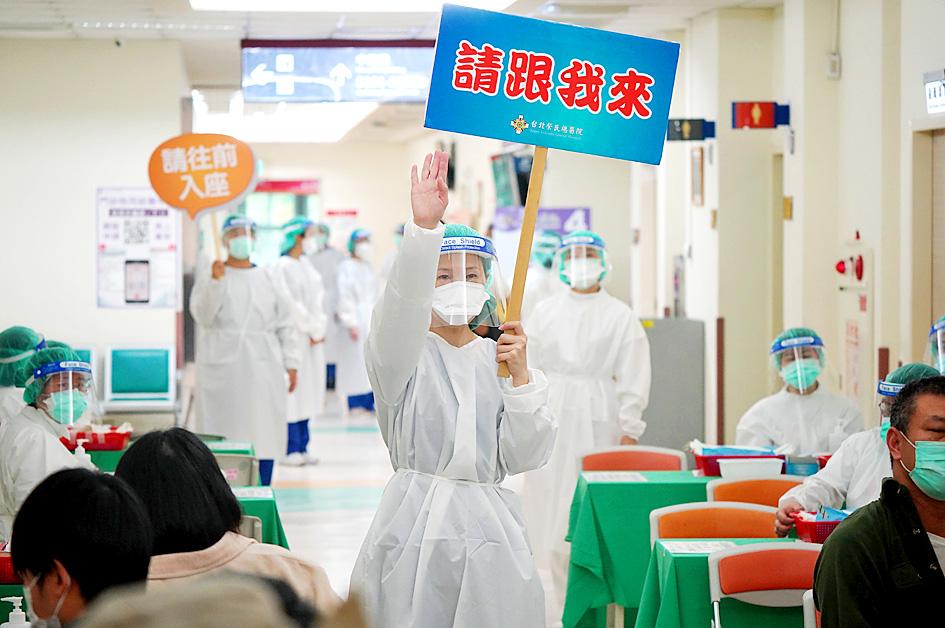Premier Su Tseng-chang (蘇貞昌) yesterday called on the public to “stay vigilant and prudent,” but added that there is “no need to be afraid” given a surge in domestic cases of the Omicron variant of SARS-CoV-2.
The Central Epidemic Command Center (CECC) on Saturday reported 82 new local infections, a high for this year.
“The Omicron variant spreads very fast, so all of a sudden, most of the cases reported around the world are Omicron cases,” Su said during a visit to the CECC yesterday. “Its rapid spread is the variant’s characteristic, but most infected people have mild symptoms, or even no symptoms, which is also the case in Taiwan.”

Photo courtesy of the Executive Yuan via CNA
“We urge everyone to stay vigilant and prudent, but there is no need to be afraid,” he said.
While the government is doing its best to slow down the spread of the Omicron variant, Su said that people should know that scientific evidence suggests that vaccines boost protection against COVID-19 and reduce the symptoms of those who become infected.
Su urged those who are not fully vaccinated or are eligible for a booster shot to make an appointment as soon as possible so that they can increase protection for themselves, their families and society as a whole.

Photo: CNA
On Friday, Su said that while the government is doing its best to achieve “zero COVID” conditions, it does not exclude the possibility that Taiwan might have learn to “live with COVID-19.”
Separartely, former vice president Chen Chien-jen (陳建仁), a public health specialist, wrote on Facebook: “We shouldn’t be afraid of living with the virus, and we must speed up in increasing full vaccination coverage.”
Before vaccines and antiviral drugs were developed, people could only rely on non-pharmaceutical interventions to keep the virus from spreading in communities, as the fatality rate of the disease was also higher, Chen said, adding that “zero COVID” was initially the goal.
As Omicron is more transmissible, but produces milder symptoms or no symptoms, getting vaccinated can induce the body’s humoral and cell-mediated immune responses, and increase protection from infection, severe illness, hospitalization or death, he said.
It is difficult for the world to eliminate such highly transmissible variants, so a “zero COVID” approach is impractical and people should be prepared to “live with” the virus, he said.
Rapid tests, vaccines and oral antivirals have been developed, and the goal for this phase of prevention should be arriving more rapidly at full vaccination coverage, he added.
In related news, Taiwan has purchased up to 10,000 courses of molnupiravir, an oral antiviral treatment for COVID-19 developed by US drugmaker Merck & Co.
While the CECC had said that the drugs would at the earliest arrive after the Lunar New Year holiday, sources yesterday said that the first delivery could arrive this morning.
Minister of Health and Welfare Chen Shih-chung (陳時中), who heads the CECC, said only that the center is keeping in close touch with the manufactuer regarding the matter.
Additional reporting by Lo Chi

US President Donald Trump yesterday announced sweeping "reciprocal tariffs" on US trading partners, including a 32 percent tax on goods from Taiwan that is set to take effect on Wednesday. At a Rose Garden event, Trump declared a 10 percent baseline tax on imports from all countries, with the White House saying it would take effect on Saturday. Countries with larger trade surpluses with the US would face higher duties beginning on Wednesday, including Taiwan (32 percent), China (34 percent), Japan (24 percent), South Korea (25 percent), Vietnam (46 percent) and Thailand (36 percent). Canada and Mexico, the two largest US trading

AIR SUPPORT: The Ministry of National Defense thanked the US for the delivery, adding that it was an indicator of the White House’s commitment to the Taiwan Relations Act Deputy Minister of National Defense Po Horng-huei (柏鴻輝) and Representative to the US Alexander Yui on Friday attended a delivery ceremony for the first of Taiwan’s long-awaited 66 F-16C/D Block 70 jets at a Lockheed Martin Corp factory in Greenville, South Carolina. “We are so proud to be the global home of the F-16 and to support Taiwan’s air defense capabilities,” US Representative William Timmons wrote on X, alongside a photograph of Taiwanese and US officials at the event. The F-16C/D Block 70 jets Taiwan ordered have the same capabilities as aircraft that had been upgraded to F-16Vs. The batch of Lockheed Martin

China's military today said it began joint army, navy and rocket force exercises around Taiwan to "serve as a stern warning and powerful deterrent against Taiwanese independence," calling President William Lai (賴清德) a "parasite." The exercises come after Lai called Beijing a "foreign hostile force" last month. More than 10 Chinese military ships approached close to Taiwan's 24 nautical mile (44.4km) contiguous zone this morning and Taiwan sent its own warships to respond, two senior Taiwanese officials said. Taiwan has not yet detected any live fire by the Chinese military so far, one of the officials said. The drills took place after US Secretary

THUGGISH BEHAVIOR: Encouraging people to report independence supporters is another intimidation tactic that threatens cross-strait peace, the state department said China setting up an online system for reporting “Taiwanese independence” advocates is an “irresponsible and reprehensible” act, a US government spokesperson said on Friday. “China’s call for private individuals to report on alleged ‘persecution or suppression’ by supposed ‘Taiwan independence henchmen and accomplices’ is irresponsible and reprehensible,” an unnamed US Department of State spokesperson told the Central News Agency in an e-mail. The move is part of Beijing’s “intimidation campaign” against Taiwan and its supporters, and is “threatening free speech around the world, destabilizing the Indo-Pacific region, and deliberately eroding the cross-strait status quo,” the spokesperson said. The Chinese Communist Party’s “threats